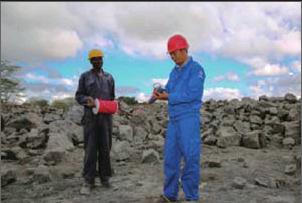Making Business More Responsible
2016-01-06ByWangJun
By+Wang+Jun

Tanzania is one of the least developed countries in the world and its outdated infrastructure severely impedes its economic development, according to the United Nations. It had no national broadband network prior to 2009, until the China International Telecommunication Construction Corp. (CITCC) started construction on Tanzanias fiber optic network.
The surge in availability and lower costs have prompted an explosive growth in Internet users and have enabled Tanzanians to enjoy electronic services such as e-banking, e-money, e-commerce and e-health. Makame Mbarawa, Tanzanias Minister of Communication, Science and Technology, remarked in November 2014 that since the first two phases of the project went into operation, the communication costs in Tanzania have been reduced significantly, with telephone and Internet costs being cut by 57 percent and 75 percent, respectively.
This is only one of several examples in which Chinese companies are assuming increasingly prominent roles in overseas markets. By the end of 2014, 18,500 Chinese domestic investors had set up 29,700 establishments in 186 countries and regions, said the 2015 Report on the Sustainable Development of Chinese Enterprises Overseas, the first of its kind that was published in Beijing in November.
The United Nations Development Program, the Research Center of the State-Owned Assets Supervision and Administration Commission of the State Council (SASAC), and the Chinese Academy of International Trade and Economic Cooperation have worked together for over a year to deliver this research, based on the largest survey to date of Chinese enterprises perceptions of their own sustainable development performance.
Zhang Jincheng, a fellow at the SASAC Research Center and one of the authors said that the report is based on the analysis of first hand data collected via questionnaires, corporate interviews and feedback from stakeholders. More than 250 Chinese enterprises operating overseas have responded to the questionnaire, among which 36 percent are state-owned enterprises (SOEs) and 63 percent are privately owned business.
In the report, “sustainable development”is defined as meeting the needs of the present without compromising the ability of future generations to meet their own needs. “The concept of sustainable development is closely related to that of corporate social responsibility. Sustainable development is a shared goal in our economy, society and environment enhancement. Therefore, responsible enterprises should live up to this broader social expectation,” the report states.
“Overseas Chinese enterprises actively take on corporate social responsibility—in 2014, the tax paid to the host countries by Chinese enterprises totaled $19.15 billion; while also hiring 833,000 local staff,” said Qian Keming, Chinas Vice Minister of Commerce. “In the future, the Ministry of Commerce (MOFCOM) will continue to improve the interconnection among policies and establish a fair, stable and transparent outbound investment cooperation policy system for a better overseas sustainable development environment.”
The survey also shows that Chinese companies report their overseas business performance as generally positive, with 13 percent of them being very profitable, 39 percent being just prof- itable and 24 percent breaking even. However, the remaining 24 percent claim to be in the red for the time being.
Supporting local partners
According to the report, nearly 90 percent of globalized Chinese companies state that they attach great importance to their host countriesnational development strategies, policies and plans. Out of which 40 percent incorporate those elements into their own development strategies and operations.
Besides improving local infrastructure, international Chinese companies self-report that they have been transferring their technologies and management experiences to partners in the host countries in ways that are tailored to the local markets.
Findings show that 87 percent of the surveyed Chinese companies have transferred their technology capabilities to the host countries or have technological cooperation with them. Around 80 percent of Chinese companies believe that there are positive splash-effects to the host countries suppliers and subcontractors, helping to improve their technological and managerial capacities.
Sustainability
A widely reported concern among developing countries is that foreign companies have no regard for local environmental impacts of their work.
“In the course of overseas operations, companies should mitigate any impacts on the environment and ecosystem,” the report stresses. “In countries with fragile ecosystems and relatively underdeveloped laws and regulations, the self-discipline and accountability of companies are particularly important.”
The survey results show that 80 percent of companies believe that their operations will not have an impact on local biodiversity and 18 percent said that there would be an impact. In their analysis of their effect on local biodiversity after years of overseas operations indicates that the companies that have “gone global” for less than five years believe that they have had less impact than those that have operated abroad for more than five years.
